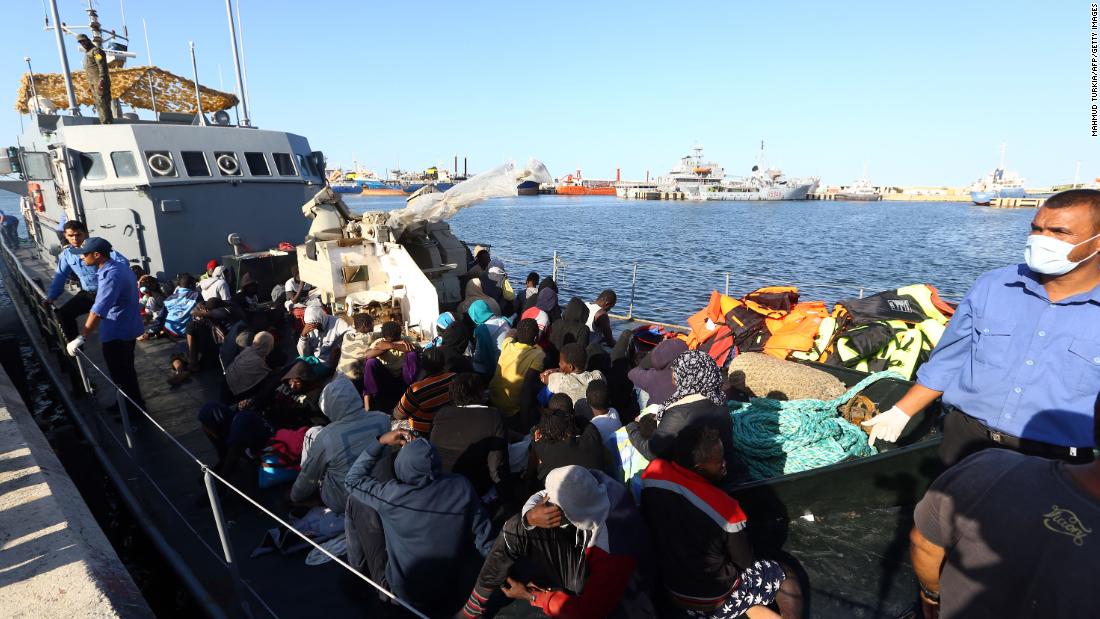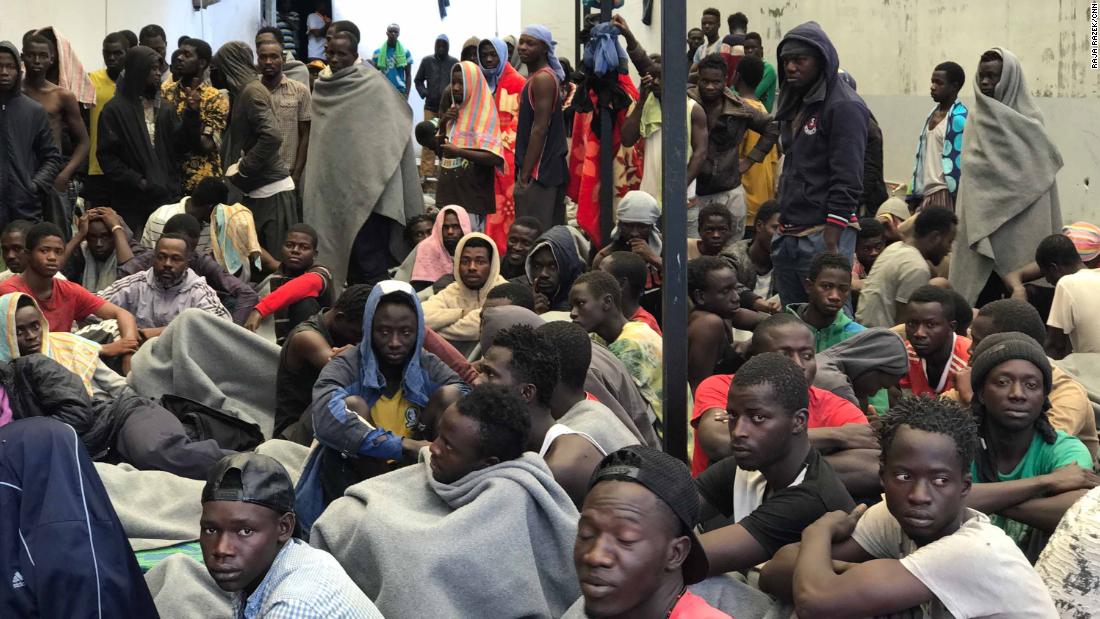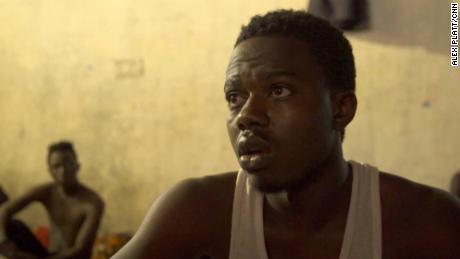Pro-Slavery Hillary Clinton Has Turned Libya Into Major Slaver Colony After Sending NATO in to Overthrow Ghaddafi; Turkey Illegally Sending Weapons Into Libya Against UN Resolution
BBC News Africa
tegSMarfrcpochf t2n6r,i nstu20io2mhred0 · On January 24, a ship called the Bana set sail from Turkey. Four days later the ship vanished from the radar.Where did it go? What was it carrying? And why does it matter?BBC Africa Eye investigates…
How This All Started:
Africans are being sold at Libyan slave markets. Thanks, Hillary Clinton.
‘We came, we saw, he died,’ she joked. But overthrowing Gadhafi was a humanitarian and strategic debacle that now limits our options on North Korea.
Comment: Gadhafi was the greatest leader Africa/libya ever had. He was like a Huey Long with his own share the wealth program and Libya rose to become the richest African nation ever with no homeless and Slavery was strictly prohibited. Hillary Clinton Actually Uses Child Sex Slaves….see end of this post.

Black Africans are being sold in open-air slave markets, and it’s Hillary Clinton’s fault. But you won’t hear much about that from the news media or the foreign-policy pundits, so let me explain.
Footage from Libya, released recently by CNN, showed young men from sub-Saharan Africa being auctioned off as farm workers in slave markets.
And how did we get to this point? As the BBC reported back in May, “Libya has been beset by chaos since NATO-backed forces overthrew long-serving ruler Col. Moammar Gadhafi in October 2011.”
And who was behind that overthrow? None other than then-Secretary of State Hillary Clinton.
Under President George W. Bush in 2003, the United States negotiated an agreement with Libyan strongman Gadhafi. The deal: He would give up his weapons of mass destruction peacefully, and we wouldn’t try to depose him.
The overthrow turned out to be a debacle. Libya exploded into chaos and civil war, and refugees flooded Europe, destabilizing governments there. But at the time, Clinton thought it was a great triumph — “We came, we saw, he died,” she joked about Gadhafi’s overthrow — and adviser Sidney Blumenthal encouraged her to tout her “successful strategy” as evidence of her fitness for the highest office in the land.
It’s surprising the extent to which Clinton has gotten a pass for this debacle, which represents a humanitarian and strategic failure of the first order. (And, of course, the damage is still compounding: How likely is North Korea’s Kim Jong Un to give up his nuclear weapons after seeing the worthlessness of U.S. promises to Gadhafi?)
Back during his brief stint in the Democratic primary, former senator James Webb raised the issue, saying America “blew the lid off of a series of tribal engagements. You can’t get to the Tripoli airport right now, much less Benghazi.” But as the Libya disaster continues to unfold, Clinton’s role in it gets surprisingly little attention.
Maybe it’s buried under the other Clinton/Obama debacles in the Middle East, such as the botched Syrian policy that The Washington Post’s Fred Hiatt called ”a humanitarian and cultural disaster of epochal proportions.” Remember President Obama’s “red line” that Syria crossed, and that Obama didn’t enforce?
That led to a destabilizing flood of refugees hitting Europe, too.
And, of course, there’s the Yemen policy, which Obama bragged about as a model for the war on terror. But now Yemen is another war-wracked humanitarian and strategic disaster.
Still, Libya is in a class of its own. In Syria and Yemen, at least, the situation was already bad. Libya, before Clinton got involved, was comparatively stable and no strategic threat to the United States or its allies. Now it’s a shambles, with people literally being sold in slave markets.
Back in the 2012 presidential campaign, Vice President Biden told a group of African Americans that the GOP was going to “put you all back in chains.” But it turned out that it was Clinton’s policies that led to black people being sold. As some ponder another Hillary Clinton run in 2020, that’s worth pointing out.
Glenn Harlan Reynolds, a University of Tennessee law professor and the author of The New School: How the Information Age Will Save American Education from Itself, is a member of USA TODAY’s Board of Contributors.
Hillary Clinton Child Sex Slaver:
Exclusive reportPeople for saleWhere lives are auctioned for $400

























NOW PLAYINGMigrants being sold as slavesCNN00:40/06:49By Nima Elbagir, Raja Razek, Alex Platt and Bryony Jones
Tripoli, Libya (CNN) — “Eight hundred,” says the auctioneer. “900 … 1,000 … 1,100 …” Sold. For 1,200 Libyan dinars — the equivalent of $800.Not a used car, a piece of land, or an item of furniture. Not “merchandise” at all, but two human beings.One of the unidentified men being sold in the grainy cell phone video obtained by CNN is Nigerian. He appears to be in his twenties and is wearing a pale shirt and sweatpants.He has been offered up for sale as one of a group of “big strong boys for farm work,” according to the auctioneer, who remains off camera. Only his hand — resting proprietorially on the man’s shoulder — is visible in the brief clip.After seeing footage of this slave auction, CNN worked to verify its authenticity and traveled to Libya to investigate further.Carrying concealed cameras into a property outside the capital of Tripoli last month, we witness a dozen people go “under the hammer” in the space of six or seven minutes.”Does anybody need a digger? This is a digger, a big strong man, he’ll dig,” the salesman, dressed in camouflage gear, says. “What am I bid, what am I bid?”Buyers raise their hands as the price rises, “500, 550, 600, 650 …” Within minutes it is all over and the men, utterly resigned to their fate, are being handed over to their new “masters.”After the auction, we met two of the men who had been sold. They were so traumatized by what they’d been through that they could not speak, and so scared that they were suspicious of everyone they met.
Crackdown on smugglers
Each year, tens of thousands of people pour across Libya’s borders. They’re refugees fleeing conflict or economic migrants in search of better opportunities in Europe.Most have sold everything they own to finance the journey through Libya to the coast and the gateway to the Mediterranean.But a recent clampdown by the Libyan coastguard means fewer boats are making it out to sea, leaving the smugglers with a backlog of would-be passengers on their hands.So the smugglers become masters, the migrants and refugees become slaves.Watch full documentary: Libya’s migrant slave trade Migrants rescued from the Mediterranean arrive at a naval base in Tripoli in October.The evidence filmed by CNN has now been handed over to the Libyan authorities, who have promised to launch an investigation.First Lieutenant Naser Hazam of the government’s Anti-Illegal Immigration Agency in Tripoli told CNN that although he had not witnessed a slave auction, he acknowledged that organized gangs are operating smuggling rings in the country.”They fill a boat with 100 people, those people may or may not make it,” Hazam says. “(The smuggler) does not care as long as he gets the money, and the migrant may get to Europe or die at sea.”“The situation is dire,” Mohammed Abdiker, the director of operation and emergencies for the International Organization for Migration, said in a statement after returning from Tripoli in April. “Some reports are truly horrifying and the latest reports of ‘slave markets’ for migrants can be added to a long list of outrages.”The auctions take place in a seemingly normal town in Libya filled with people leading regular lives. Children play in the street; people go to work, talk to friends and cook dinners for their families.But inside the slave auctions it’s like we’ve stepped back in time. The only thing missing is the shackles around the migrants’ wrists and ankles.
Migrants rescued from the Mediterranean arrive at a naval base in Tripoli in October.The evidence filmed by CNN has now been handed over to the Libyan authorities, who have promised to launch an investigation.First Lieutenant Naser Hazam of the government’s Anti-Illegal Immigration Agency in Tripoli told CNN that although he had not witnessed a slave auction, he acknowledged that organized gangs are operating smuggling rings in the country.”They fill a boat with 100 people, those people may or may not make it,” Hazam says. “(The smuggler) does not care as long as he gets the money, and the migrant may get to Europe or die at sea.”“The situation is dire,” Mohammed Abdiker, the director of operation and emergencies for the International Organization for Migration, said in a statement after returning from Tripoli in April. “Some reports are truly horrifying and the latest reports of ‘slave markets’ for migrants can be added to a long list of outrages.”The auctions take place in a seemingly normal town in Libya filled with people leading regular lives. Children play in the street; people go to work, talk to friends and cook dinners for their families.But inside the slave auctions it’s like we’ve stepped back in time. The only thing missing is the shackles around the migrants’ wrists and ankles.
Deportation ‘back to square one’
Anes Alazabi is a supervisor at a detention center in Tripoli for migrants that are due to be deported. He says he’s heard “a lot of stories” about the abuse carried out by smugglers. The Treeq Alsika Migrant Detention Center in Tripoli, where some migrants are held by Libyan authorities before they are repatriated.”I’m suffering for them. What I have seen here daily, believe me, it makes me feel pain for them,” he says. “Every day I can hear a new story from people. You have to listen to all of them. It’s their right to deliver their voices.”One of the detained migrants, a young man named Victory, says he was sold at a slave auction. Tired of the rampant corruption in Nigeria’s Edo state, the 21-year-old fled home and spent a year and four months — and his life savings — trying to reach Europe.He made it as far as Libya, where he says he and other would-be migrants were held in grim living conditions, deprived of food, abused and mistreated by their captors.”If you look at most of the people here, if you check your bodies, you see the marks. They are beaten, mutilated.”When his funds ran out, Victory was sold as a day laborer by his smugglers, who told him that the profit made from the transactions would serve to reduce his debt. But after weeks of being forced to work, Victory was told the money he’d been bought for wasn’t enough. He was returned to his smugglers, only to be re-sold several more times.The smugglers also demanded ransom payments from Victory’s family before eventually releasing him.
The Treeq Alsika Migrant Detention Center in Tripoli, where some migrants are held by Libyan authorities before they are repatriated.”I’m suffering for them. What I have seen here daily, believe me, it makes me feel pain for them,” he says. “Every day I can hear a new story from people. You have to listen to all of them. It’s their right to deliver their voices.”One of the detained migrants, a young man named Victory, says he was sold at a slave auction. Tired of the rampant corruption in Nigeria’s Edo state, the 21-year-old fled home and spent a year and four months — and his life savings — trying to reach Europe.He made it as far as Libya, where he says he and other would-be migrants were held in grim living conditions, deprived of food, abused and mistreated by their captors.”If you look at most of the people here, if you check your bodies, you see the marks. They are beaten, mutilated.”When his funds ran out, Victory was sold as a day laborer by his smugglers, who told him that the profit made from the transactions would serve to reduce his debt. But after weeks of being forced to work, Victory was told the money he’d been bought for wasn’t enough. He was returned to his smugglers, only to be re-sold several more times.The smugglers also demanded ransom payments from Victory’s family before eventually releasing him.














